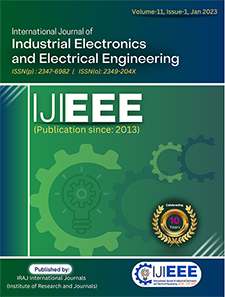Publish In |
International Journal of Industrial Electronics and Electrical Engineering (IJIEEE)-IJIEEE |
 Journal Home Volume Issue |
||||||||
Issue |
Volume-2,Issue-6 ( Jun, 2014 ) | |||||||||
Paper Title |
Low Power Usage With A Reduced Time Delay In Dmppss By Discarding Dead Packets For Wireless Sensor Network | |||||||||
Author Name |
Mohammad Zaid Qureshi, Akshay Kirolikar, Isha Bodkha, N.Showme | |||||||||
Affilition |
Department of Telecommunication Engineering, SRM University, Chennai Assistant Professor, Department of Telecommunication Engineering, SRM University, Chennai | |||||||||
Pages |
59-63 | |||||||||
Abstract |
Scheduling different types of packets, such as real-time and non-real-time data packets, with removal of dead packets at sensor nodes with resource constraints in Wireless Sensor Networks (WSN) is of vital importance to reduce sensors' energy consumptions and end-to-end data transmission delays. Most of the existing packet-scheduling mechanisms of WSN use First Come First Served (FCFS), non-preemptive priority and preemptive priority scheduling algorithms. These algorithms incur a high processing overhead and long end-to-end data transmission delay due to the FCFS concept, starvation of high priority real-time data packets due to the transmission of a large data packet in non-preemptive priority scheduling, starvation of non-real-time data packets due to the probable continuous arrival of real-time data in preemptive priority scheduling, and improper allocation of data packets to queues in multilevel queue scheduling algorithms. In this paper, we propose a Dynamic Multilevel Priority (DMP) packet scheduling scheme. In the proposed scheme, each node, except those at the last level of the virtual hierarchy in the zone-based topology of WSN, has three levels of priority queues. Real-time packets are placed into the highest-priority queue and can preempt data packets in other queues. Non-real-time packets are placed into two other queues based on a certain threshold of their estimated processing time. Leaf nodes have two queues for real-time and non-real-time data packets since they do not receive data from other nodes and thus, reduce end-to-end delay. We evaluate the performance of the proposed DMP packet scheduling scheme through simulations for real-time and non-real-time data. Simulation results illustrate that the DMP packet scheduling scheme outperforms conventional schemes in terms of average data waiting time and end to end delay. | |||||||||
| View Paper | ||||||||||